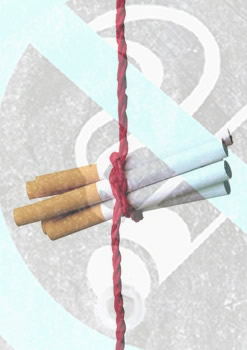Apr 16 2007
According to a new study air quality has improved in bars since smoking was banned in Irish pubs in March 2004 and pub workers are now exposed to far fewer cancer-causing substances.
 The smoking ban has reduced air pollution in pubs and as a result improved bar-workers' health.
The smoking ban has reduced air pollution in pubs and as a result improved bar-workers' health.
Ireland is the first country to impose a nationwide ban.
A team of scientists from the Research Institute for a Tobacco Free Society in Dublin, conducted a study of environmental tobacco smoke exposure in 42 Dublin pubs and also tested 73 bar workers who volunteered to take part in the study.
The workers were all given lung function tests before the ban came in and a year later.
The researchers found that Irish workers today were being exposed to tobacco smoke for an average of 25 minutes a week, compared to 40 hours before - a 99 percent decline and the level of air pollution in pubs has declined 83 percent, and the level of airborne carcinogens is down 80 percent and workers' lung function also improved.
Traffic-generated pollution is now the major remaining threat to respiratory health.
Smoking bans are already in place in Wales and Scotland. Northern Ireland will follow suit on 30 April, with England's ban coming into force on 1 July.
Lead researcher Dr. Luke Clancy says the results confirm that the approach of a total ban on smoking in the workplace is successful in reducing the exposure of workers to particles.
Action on Smoking and Health (ASH) says the study directly shows the harm of tobacco smoke and how comprehensive smoke-free public places can reverse the harm.
But the smokers' lobby group Forest, has called the study a feeble report which does not justify a ban on smoking in every pub, club and bar in the country.
The group is calling for good ventilation systems in some pubs to reduce smoke so that people have a choice of working or socialising in a smoke-free environment or a well-ventilated, designated smoking lounge.
Despite the fact that a third of all adults smoke in Ireland and the country has a population of 4.2 million with more than 10,000 pubs, the ban has been surprisingly popular.
Offenders risk a maximum $4,000 fine.
The study was sponsored by cancer and anti-smoking organizations in Ireland and is published in the American Journal of Respiratory and Critical Care Medicine.